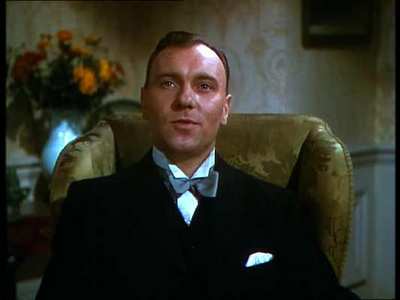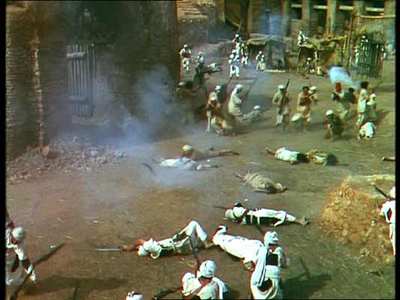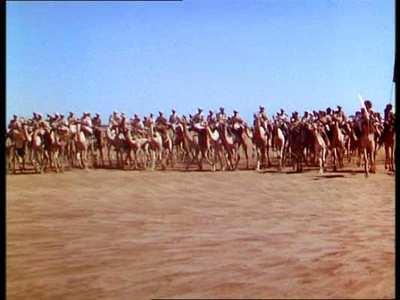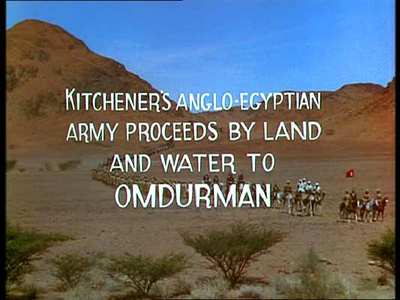The Four Feathers, The (1939)
Introduction
This is the story of a young 15 year old boy, Harry Faversham, who is expected to continue the great family tradition of embarking on a long and distinguished military career (more distinguished if he dies violently while facing the enemy of course). Unfortunately, he would rather spend his time reading poetry, so he is asked to join a group of aging comrades-in-arms who all fought in the Crimea many years before. Soon after the fall of Khartoum, they spend the evening discussing half-remembered military tactics, and how it`s much better to die horribly in action, embellishing the stories by recollecting a few particularly bloody deaths. One story of a soldier who froze in the face of the enemy, and suffered such shame afterwards that he shot himself through the head is meant to make Harry come around to their way of thinking. It does the complete opposite.
Ten years later, Kitchener has decided he wants to take Khartoum back from the Dervishes and Fuzzy Wuzzies, and Harry`s regiment is ordered off to the Sudan. Harry resigns his commission the day before the off and goes back to his sweetheart, Ethne. She is not as delighted as he had assumed (despite everything they had discussed), and when he receives a package containing three white feathers, each attached to the card of ex-comrades, he realises that she too would have given him one as well (if she had thought of it of course).
He decides to make up for his cowardly act by travelling to Egypt and help out in whatever way he can.

Video
For a film made in 1939, the quality is rather good, although I`m not sure much, if any, restoration has been done. The `Technicolor` aspect lacks a little edge in many of the scenes, but the scarlet of the regimental dress stands out a mile. There are quite a few scratches on the print, and it is obvious where some frames were missing, but there is nothing to make it unwatchable.

Audio
The mono sound is very good indeed, and I was delighted to hear an unfamiliar Miklós Rózsa score as it was intended, although the (sometimes) frantic editing obviously made it difficult for him to stick to the same style of music for more than a few seconds, which doesn`t often give the greatest impression.
There is also a very slight lip-synch problem throughout, which is a shame.

Features
Extras include a trailer, which begins with the lines (and you have to imagine this being spoken as if the viewers were being addressed by a hellfire Presbyterian minister), "Three times has London Film Productions sent units to remote corners of the British Empire to bring back thrilling material for your entertainment…", continuing to mention three films I have never seen (or probably heard of). `Hell and Damnation` Evans continues to `thrill` us by telling us we will see `Hordes of savage, war-crazed fuzzy wuzzies..". Yes, well indeed.
The main extra however, is far more palatable, being a 1973 LWT Russell Harty interview with Sir Ralph Richardson. Harty hardly gets a word in edgeways, but is sensible enough to allow Richardson to talk about almost anything he can put his mind to, immediately showing latter-day chat show hosts how it`s done. It`s a shame that the original clip of `Rollerball` (in which Richarson plays `The Librarian`, and which had just come out at the time of the recording) is not shown here `for contractual reasons`. The final section consists of Richardson reciting Keats` `Ode to Autumn` (slightly over-the-top, but utterly compelling nonetheless).
A slight glitch my disc meant that I had to stop the playback after the clip was shown (or wasn`t shown in this case) as the video went a bit haywire, though a re-start sorted the problem out.

Conclusion
The Four Feathers is a perfect example of a `Boy`s Own` story which is almost an epic, but doesn`t quite reach the heights of others in the same mould, probably due to the utterly contrived and unbelieveable story. Zoltan Korda, however, is at his best in every scene, except unfortunately when the love interest gets her face on screen. June Duprez (Ethne) is wooden at the best of times, and her overblown plummy accent really got on my nerves.
The editing is also not the best, as can be seen in the first two and a half minutes, which is supposed to show the fall of Khartoum in all its sordid frightfulness (plummy accents would help here), but is just a mess.
Ralph Richardson (Durrance) acts out of his skin, and is easily the true hero of the story, as John Clements (Faversham) is a bit of a wet flannel, despite his sudden surge of super-human heroics. In this respect, he and Ethne are well-suited.
I`m not sure if the opening scene in which the veterans are discussing the old campaigns is meant to be comical, but it raised a few smiles, and shows an attitude towards warfare amongst the privileged that continued up to, and including the Great War.
If you keep in mind that the story, and indeed the way in which the film is made, is of a particular age, then this is to be highly recommended. Constant references to `Fuzzy Wuzzies` seem beyond the pale nowadays, but it`s no more than we ever heard from Corporal Jones in `Dad`s Army` (this was the campaign about which he went on so much - which is ironic, as John Laurie plays the enemy leader here). The interview with Richardson should swing it for anyone with an open mind, and for whom the importance of getting historical films out onto DVD is a lot more persuasive than worrying about being too politically correct.
Your Opinions and Comments
Be the first to post a comment!